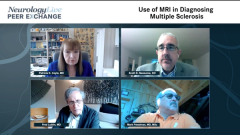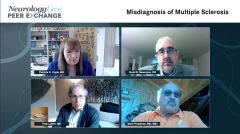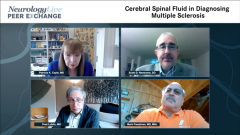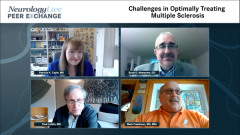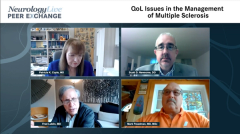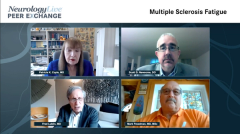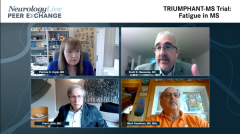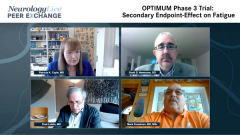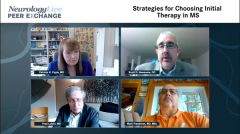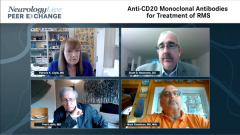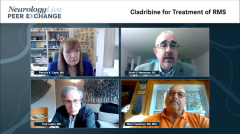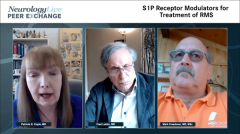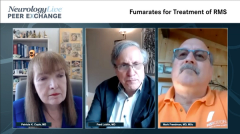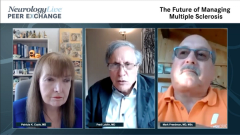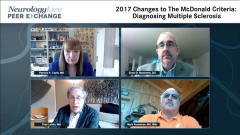
TRIUMPHANT-MS Trial: Fatigue in MS
Episodes in this series

Panelists debate the results of the TRIUMPHANT-MS clinical trial of 3 commonly used medications for treatment of MS-related fatigue (amantadine, modafinil, methylphenidate) vs placebo in fatigued subjects with MS.
Fred Lublin, MD: I want to ask Scott to tell us a bit about the TRIUMPHANT-MS trial. Prior studies of medications to treat MS fatigue have been less than entirely satisfactory. They produce conflicting results, and it’s been difficult to study. Scott, take us through this particular trial.
Scott D. Newsome, DO: This is an interesting study. A colleague of mine at Johns Hopkins Medicine spearheaded this. It was PCORI [Patient-Centered Outcomes Research Institute] funded. What are the more common oral therapies that we use in clinical practice for fatigue in our patients? We sometimes try amantadine, Adderall [amphetamine-dextroamphetamine], Ritalin [methylphenidate], or Provigil [modafinil]. Bardia Nourbakhsh was interested in looking at 3 of the more common antifatigue medications, including amantadine, Provigil, and methylphenidate vs placebo. Patients were randomized. At different timepoints, they were all on 1 of these medications and then would switch to another. The bullet point here is that none of the treatments that we typically use for fatigue in MS were superior to placebo.
It was interesting because I use these medicines all the time in patients. It’s like a flip of a coin which of these medicines will help, even if it’s subjective. It was interesting to see the final results. It was a small study. It was a pilot trial. It was short in duration. Given the small sample size, maybe there are subgroups of patients who would benefit from 1 of these therapies.
If you look at some of the secondary end points, there was some suggestion of statistically significant improvements in fatigue or psychosocial fatigue with these medications vs placebo. That says to me that in certain circumstances, maybe these medicines will be helpful. There was a sleep index that showed significance. You wonder, is that just an effect because someone is tired? You give them Provigil, for example, which we know was approved for narcolepsy. Maybe the added benefit is for those who don’t sleep very well.
The question is, has that changed my practice for my patients currently? Not really. I will still try these medications, just because we have nothing else to offer outside sleep study, exercising in moderation, or quitting smoking. It’s about healthier lifestyle choices. If you’re on interferon and we can connect that the fatigue worsened in that context, maybe we can switch the therapy because of that.
Right now, we need further data. We need a larger study to prove that there’s not a subgroup of people who would respond to the therapies that were studied. That’s my 50,000-foot view on it.
Fred Lublin, MD: What is psychosocial fatigue?
Scott D. Newsome, DO: Your guess is as good as mine.
Mark Freedman, MD, MSc: I think we suffer from it.
Scott D. Newsome, DO: Right now, I have a lot of it. It could be a lot of things. It could be that you’re not happy in your life, whether it’s your home life or you lost your job. It’s a pretty broad umbrella.
Fred Lublin, MD: Pat, what are your thoughts on current strategies for treating fatigue?
Patricia K. Coyle, MD: If we could figure out the cause of primary MS fatigue, that would give us meaningful treatments. We can see that there are maybe 3 popular antifatigue medications. We disabuse patients. We say there’s maybe a fifty-fifty chance they will fail—granted, it’s a preliminary study, but they all failed. They fell on their faces. We don’t have great treatments. I’m not very encouraging. I’m happy to try them, and I still do. It argues for figuring out what causes primary MS fatigue, because then we could target development of treatments much better.
Fred Lublin, MD: Mark?
Mark Freedman, MD, MSc: I would like to have seen a fifth arm in a study like this. I work closely with an exercise physiologist, and she is adamant about regular exercise. We all know this, because the data are coming in regularly. It doesn’t matter how you do it, at what stage you’re doing it, or a patient’s EDSS [Expanded Disability Status Scale] rating. There is an established benefit of exercise at every level. One of the factors that’s been affected by exercise is fatigue.
If a patient can increase their exercise tolerance, by definition, they’re doing away with the fatigue. If nothing else, adding that to whatever pharmacological measure you’re using will probably give you much more benefit. My bet is that if you did the randomized study with that fifth arm, that would probably come out on top.
The problem with the Hopkins study was that, as both of you have alluded to, fatigue is this huge, heterogeneous category. There are probably patients in there that are in need of a booster for their wakefulness. That’s where these drugs with amphetamine bases are probably going to have some benefit. But the downside is they cause insomnia, and that may worsen the sleep problem.
In select patients, some of these medications are useful. The study does show us that if you throw everyone in there using the fatigue index as a measure, you’ve got so much heterogeneous response that the overall outcome is negative.
Newsletter
Keep your finger on the pulse of neurology—subscribe to NeurologyLive for expert interviews, new data, and breakthrough treatment updates.

